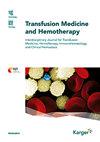短期冷藏后储存的血小板反应性增加
IF 1.9
4区 医学
Q3 HEMATOLOGY
引用次数: 0
摘要
& lt; b> & lt; i>简介:& lt; / i> & lt; / b>由于血小板反应性增高,冷冻血小板被认为在治疗急性出血中具有优势。低温(CT)引起的抑制信号的缓解已被确定为促进血小板反应性增强的重要机制,在冷藏1小时内新鲜制备的血小板中可检测到。本研究的目的是确认短期冷藏对血小板分离衍生的血小板浓缩物(APC)的影响。& lt; b> & lt; i>方法:& lt; / i> & lt; / b>APC在标准条件下保存1天或在室温下保存2天,然后冷藏1小时,然后采集血小板进行分析。血小板反应性通过不同激动剂阈值浓度的聚集研究和使用流式细胞术检测纤维蛋白原结合来测量。抑制信号的探索包括使用流式细胞术或Western blot检测VASP磷酸化和环核苷酸水平的测量。& lt; b> & lt; i>结果:& lt; / i> & lt; / b>ADP、胶原或凝血酶受体激活肽-6 (TRAP-6)诱导的聚集反应在冷藏1小时后在APC中增加,与TRAP-6诱导的纤维蛋白原结合升高有关。冷暴露后VASP磷酸化水平降低,在储存1天和2天的APC中用流式细胞术检测到,在储存2天的APC中用Western blot技术检测到。第1天和第2天,APC经CT保存后,诱导的cGMP水平降低,而APC保存2天后,cAMP水平降低。& lt; b> & lt; i>结论:& lt; / i> & lt; / b>短期冷藏1小时足以诱导抑制信号的衰减,并伴随着APC储存长达2天的聚集反应增加。PC的“按需”冷藏可能是制备反应性增强的血小板的一种合理方法,可以更有效地治疗出血患者,这需要在后续的研究中进一步研究。本文章由计算机程序翻译,如有差异,请以英文原文为准。
Increased Responsiveness of Stored Platelets after Short-Term Refrigeration
Introduction: Refrigeration of platelets is considered to provide advantages in therapy of acute hemorrhage due to increased platelet responsiveness. The alleviation of inhibitory signaling caused by cold temperature (CT) has been identified as an important mechanism contributing to enhanced platelet reactivity, detectable in freshly prepared platelets within 1 h of cold storage. The aim of this study was to confirm the effects of short-term refrigeration in platelets from apheresis-derived platelet concentrates (APC). Methods: APC were stored under standardized conditions for 1 day or for 2 days at room temperature and then refrigerated for 1 h, followed by sampling of platelets for analysis. Platelet reactivity was measured by aggregation studies using threshold concentrations of different agonists and by detection of fibrinogen binding using flow cytometry. The exploration of inhibitory signaling comprised the detection of VASP phosphorylation using flow cytometry or Western blot and the measurement of cyclic nucleotide levels. Results: Aggregation responses induced with ADP, collagen, or thrombin receptor-activating peptide-6 (TRAP-6) were increased in APC after cold storage for 1 h, associated with elevated TRAP-6-induced fibrinogen binding. VASP phosphorylation levels were decreased after cold exposition, detectable in 1-day- and 2-day-stored APC with flow cytometry, and in 2-day-stored APC with Western blot technique. Induced cGMP levels were lower after storage at CT in APC on day 1 and on day 2, whereas cAMP levels were reduced on 2-day-stored APC. Conclusion: Short-term refrigeration for 1 h is sufficient to induce an attenuation of inhibitory signaling, accompanied with increased aggregation responses in APC stored for up to 2 days. The “on demand” refrigeration of PC may be a reasonable approach for the preparation of platelets with enhanced responsiveness to treat patients with hemorrhage more effectively, which should be further addressed in consecutive studies.
求助全文
通过发布文献求助,成功后即可免费获取论文全文。
去求助
来源期刊
CiteScore
4.00
自引率
9.10%
发文量
47
审稿时长
6-12 weeks
期刊介绍:
This journal is devoted to all areas of transfusion medicine. These include the quality and security of blood products, therapy with blood components and plasma derivatives, transfusion-related questions in transplantation, stem cell manipulation, therapeutic and diagnostic problems of homeostasis, immuno-hematological investigations, and legal aspects of the production of blood products as well as hemotherapy. Both comprehensive reviews and primary publications that detail the newest work in transfusion medicine and hemotherapy promote the international exchange of knowledge within these disciplines. Consistent with this goal, continuing clinical education is also specifically addressed.

 求助内容:
求助内容: 应助结果提醒方式:
应助结果提醒方式:


